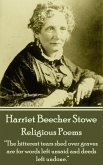In "A Key to Uncle Tom's Cabin," Harriet Beecher Stowe provides a profound exploration of the themes and social critiques embedded within her seminal work, "Uncle Tom's Cabin." Written in a compelling yet accessible literary style, this book serves both as a defense of her original novel and as a document meant to elucidate the accuracy of her portrayals of slavery and its moral implications. Stowe meticulously references her sources and weaves in contemporary debates surrounding the institution of slavery, situating her narrative within the broader abolitionist movement of the 19th century. Her approach is not only polemical but also deeply empathetic, aiming to invoke a moral reckoning among her readers. Stowe, an ardent abolitionist and a member of the prominent Beecher family, draws from her own experiences and observations of the horrors of slavery, which undoubtedly fueled her passion for social change. Her extensive knowledge garnered from personal encounters and correspondence with formerly enslaved individuals shaped her narrative, making it a powerful call to action against the inhumanity of slavery. Stowe's position as a woman author in a predominantly male literary landscape also speaks to her determination to advocate for marginalized voices. Readers seeking insight into the moral and ethical complexities of slavery will find "A Key to Uncle Tom's Cabin" indispensable. This work not only complements the narrative of her iconic novel but also serves as a vital historical document that encourages critical reflection. Stowe'Äôs diligent research and earnest dialogue invite readers to engage thoughtfully with the pressing social issues of her time and remain relevant to contemporary discussions.
Dieser Download kann aus rechtlichen Gründen nur mit Rechnungsadresse in A, B, BG, CY, CZ, D, DK, EW, E, FIN, F, GR, H, IRL, I, LT, L, LR, M, NL, PL, P, R, S, SLO, SK ausgeliefert werden.









